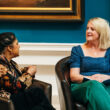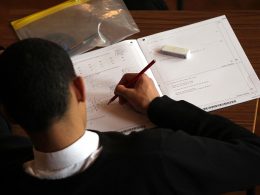Sport ‘noun’ – an activity involving physical exertion and skill in which an individual or team competes against another or others.
It was only a game of rounders at playtime at primary school but the memory still lingers. I hadn’t really wanted to take part but the whole class was playing so I didn’t want to be left out. I was fielding and lurking quite a distance back, a little bored but trying to keep a low profile. Then the opposing team hit a belter and it was coming straight at me. An easy catch to put their whole team out. But the ball bounced out my hands and I can still hear the collective groan from my team and one boy tutting my name along with a disapproving look. In short, I felt terrible. But before everyone jumps up to say take the knocks, it makes you stronger etc. etc. the thing is, I am just not competitive. I have never been and this is why I was reluctant to take part in the first place. And again before everyone says competition is a good thing …. well yes it can be, for those who are competitive. But for folk like myself, it’s an ongoing nightmare because everything gets turned into a competition and not having a competitive streak is somehow seen as a bad thing.
This brings me around to sport. Now I am not anti-sport. Not in the slightest. It’s a fabulous thing and when the winter Olympics are on I’ll be glued to the telly in awe. My particular concern is using sport as a way of encouraging more kids and adults to exercise.
Obesity is a ticking time bomb in the UK. The 2017 Health at a Glance Report published by the OEDC stated UK obesity had increased by 92% since the 1990s. The fall out from this will inevitably have a major impact on health and the NHS but more importantly, it is a national tragedy if the majority of the population have preventable health issues.
The report on Physical Activity and Diet in England 2017 published by the National Statistics Office found that in 2015, 58% of women and 68% of men were overweight or obese. Think about that for a minute.
The same report found that in 2015/16 20% of Reception aged children were obese or overweight and this rose to over 33% by year 6. There were 525,000 admissions in NHS hospitals where obesity was recorded as a factor and 26% of adults were classified as inactive (fewer than 30 minutes physical activity a week).
The Scottish Health Study 2016 reported that 65% of adults aged 16 and over were overweight, including 29% who were obese. 14% children aged 2 to 15 were at risk of obesity, with a further 15% at risk of being overweight.
As a nation, we are becoming larger. We are eating more calories than we can expend. So the solution? I’m sure it is very complex and changing our eating habits is obvious but a simple start would be to move around more and get some exercise. There have been numerous government initiatives to get folk doing just that but if these statistics are anything to go by, none seem to be having any impact and £millions are pumped into the promotion of sport in the hope that it will ultimately encourage people off the sofa and into the park.
Every time a major sporting event like the Olympics or Commonwealth Games is on, there is an obsession with how well Team GB or Scotland is doing on the medal tables and just taking part no longer seems enough in itself. There is little denying the feel-good factor of doing well at such events but the physical benefits affect only that minuscule percentage of those taking part. The Rio Olympics in 2016 was the UK’s most successful medal haul but at a cost of just over £4million per medal to the British taxpayer has it made those most in need of exercise do more?
More recently the 2014 Commonwealth Games in Glasgow was supposed to leave a lasting legacy and increase participation in sports. One of the key promises made by organisers was that it would inspire the nation to become more active however the 2014 Scottish Health Survey found there had been almost no change in levels of physical activity in Scotland since the Games. Professor Nanette Mutrie, director of physical activity for the Health Research Centre at Edinburgh University, said the figures were “disappointing” but no country has seen an upturn in participation levels on the back of a major sporting event.
Furthermore, the Scottish Government’s legacy report on the Games suggests that the £425 million of public money spent would have had roughly the same economic impact if it had been spent on other things and although it provided a £100 million boost to Glasgow’s economy, Scotland as a country did not enjoy any significant financial advantages.
So could this money not have been used more effectively to encourage activities at the grass-roots level? Very successful sports people are held up as icons to which we should aspire but the reality is, such achievements will only happen for a tiny, tiny percentage of the population who are undoubtedly extremely driven and committed anyway.
We refer to these sporting icons as heroes. Yes, they’ve done brilliantly but heroes? Why is that term, outside of acts of bravery, reserved solely for sporting achievements? Where are the art heroes or the music heroes or the just getting on with life and holding down two jobs whilst raising a family hero? Again subliminal messages that sportsmen and women have done something more worthy than the rest of us.
Now I really don’t want to come across as knocking sportsmen and women, they deserve their medals and glory, but whilst there is a place for such sporty icons if we are trying to get more people, especially girls, exercising then just show normal folk enjoying being active. Show the people who fail but are still having a brilliant time. Show the people who are, frankly, dreadful at their sport but still pick themselves up and take part. Can we have more ‘Eddie the Eagles’ please? He epitomises everything that is right and wrong about sport. Someone determined to take part even though there was no chance of a medal. Someone who was looked down upon by sporting establishments to the extent that in 1990 the International Olympic Committee (IOC) changed the rules meaning an athlete had to be in the top 30% of international competitors thus preventing similar exploits from ever happening again. Eddie the Eagle did not bother about winning or losing, he just wanted to take part. His grit and determination as well as his thick skin to absorb all the knocks from both physical injuries and verbal abuse is what makes him special. However most folks don’t have those special qualities, and thanks to the IOC they no longer have people like Eddie as role models.
To sports coaches everywhere, for every potential Olympian that passes through your hands, encourage them yes, but don’t neglect the hundreds of others who will lose interest because you focussed on the winners and put pressure on the others to be like them. There is nothing wrong with being competitive but equally, there is nothing wrong with not being competitive. To even suggest otherwise, subliminally adds to that perception that if you’re not competitive then there is something wrong with you, which in turn may put someone off taking part in a sporty activity even more. However, everything seems geared around putting pressure on folk to compete when all they might want is to play for fun.
By its very definition, even the word sport implies competition where there are winners and losers. How many kids are put off at high school because they know they aren’t as good as the top athletes in their class? Because they don’t want to be a loser? I myself like to be active but as soon as pressure is put on me to compete, I back off big time. And there are many like me. Imagine that there were two teams for everything. The one for the sporty, competitive folks and the one purely for fun. At the end of the session, it means both teams have spent time being active to suit their own selves.
I am glad to see that as well as all the usual individual and team sports, my kids’ school is promoting activities at lunchtimes with an emphasis that it is just for fun and not competitive. Perhaps the message is finally dripping through. The sporty people and the non-sporty people need different sorts of encouragement. And we need to stop obsessing about a sport and being the best and start obsessing about just being active. Thankfully my experience at rounders didn’t turn me into a couch potato, however, I am still not competitive. I do many things which could be classed as sporty and I’m often described as sporty but I challenge this, on behalf of non-competitive people everywhere, and say I am active, not sporty. There is room in the world for both and that needs to be recognised and accepted if we want the health of the nation saved.
Come and join our new group discussion on Facebook by clicking here. [vc_message]Perth Gazette blogs is a place for opinions. These opinions belong to the author and are not necessarily shared by Perth Gazette. [/vc_message]








